Graham Reid | | 4 min read
Sulamangalam Sisters: Thiruneeril
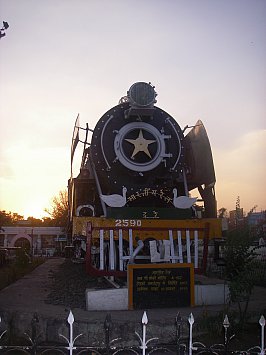
Look through any window . . .
For the past couple of decades I've taken a quick and unfiltered photo out the window of every room I've stayed in, if there's been a window. The views are inevitably varied: a dramatic sweep of deserted beach in remote Australia; car-clogged streets in China; and a filthy brick wall in filthy rich Brunei.
Traveling by train in India meant every day there would be a different view outside the window. So I did what I've always done and when the train stopped I took unmediated photos of just what was on the other side of the glass.
In Mumbai (Bombay) it was three men and a trolley in a scrappy field outside a State Bank ATM no larger than an outhouse.
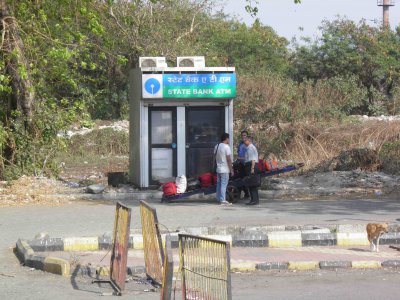 Further on the dirty tiles of a platform wash stand, and
over subsequent days an odd little whitewashed station house, a
picket fence which looked like a cliched slice of a middle-class
American suburb dropped into this alien landscape, refreshment stands
and bookshops, a wall of blue steel because a freight wagon had
shunted up alongside, the impenetrably black night punctuated by
distant fires and huddled figures . . .
Further on the dirty tiles of a platform wash stand, and
over subsequent days an odd little whitewashed station house, a
picket fence which looked like a cliched slice of a middle-class
American suburb dropped into this alien landscape, refreshment stands
and bookshops, a wall of blue steel because a freight wagon had
shunted up alongside, the impenetrably black night punctuated by
distant fires and huddled figures . . .
And mostly just people; a man reading his cellphone, a stately young woman in bare feet sweeping the platform, an old man hiking up his dhoti and pissing on the track, a wizened woman of indeterminate age cross-legged in the dirt under the meagre shade of a scrawny tree in the high heat of noon . . .
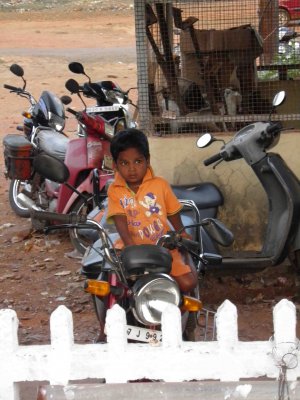 There were sandal-wearing businessmen
in pressed white shirts, well-dressed families, lone
travelers with haunted eyes, dusty itinerant mendicants with long
grey beards, the poorest of the poor carrying meagre possessions in
thin blankets but cheerfully waving in my direction, passengers from
another train just a metre away staring back at me as an alien life
form, teenage girls giggling behind their hands, a wide-eyed child
sitting on a new motor scooter and waiting for a parent. . .
There were sandal-wearing businessmen
in pressed white shirts, well-dressed families, lone
travelers with haunted eyes, dusty itinerant mendicants with long
grey beards, the poorest of the poor carrying meagre possessions in
thin blankets but cheerfully waving in my direction, passengers from
another train just a metre away staring back at me as an alien life
form, teenage girls giggling behind their hands, a wide-eyed child
sitting on a new motor scooter and waiting for a parent. . .
There were crowds and crowds and even bigger crowds of people sitting, standing, squatting, pissing, and waiting and waiting.
Day after day there were people.
And so many that individuals became a blur of humanity, a constant crowd of increasingly faceless faces.
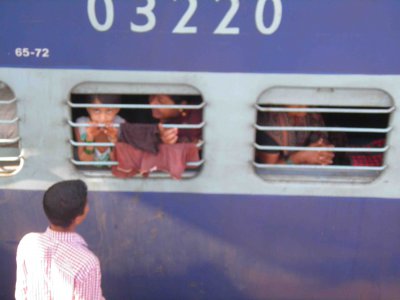 Then sometimes, abruptly, the crowd
would disappear onto another train: the pushing, throwing on of bags,
the baby lifted over the heads of others packing themselves on, young
men clambering up a ladder or hanging precariously off handles and
door frames as the train pulls away . . .
Then sometimes, abruptly, the crowd
would disappear onto another train: the pushing, throwing on of bags,
the baby lifted over the heads of others packing themselves on, young
men clambering up a ladder or hanging precariously off handles and
door frames as the train pulls away . . .
Just people of every imaginable condition who gravitated to the rail lines which cross the country like pulsing arteries between cities and become thin capillaries into towns and villages.
All these people, all these bands of steel, all these trains, all going somewhere else.
A nation on wheels . . .
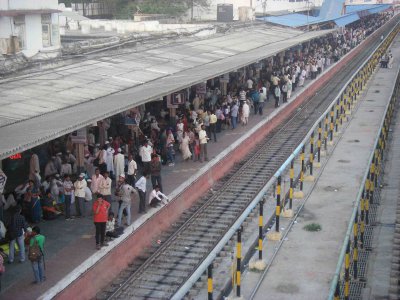 The writer Ramachandra Guha speaks of
the “miracle of India” and – despite the volatile diversity of
cultures and religions, endemic poverty running parallel to the
increasingly wealthy middle and upper classes, political divisions
and a population spiraling towards 1.5 billion – this is a country
which is astonishing in many ways. A miracle made flesh.
The writer Ramachandra Guha speaks of
the “miracle of India” and – despite the volatile diversity of
cultures and religions, endemic poverty running parallel to the
increasingly wealthy middle and upper classes, political divisions
and a population spiraling towards 1.5 billion – this is a country
which is astonishing in many ways. A miracle made flesh.
And it's a nation on the move. Tour guides, random taxi drivers with a decent command of English and especially men in uniform on the platform will proudly run off breathtaking statistics about the country's rail network.
It is the nation's largest employer, moves about 20 million people every day to all corners of the country and has almost 8000 stations . . . where people sit, stand, squat, piss, eat and wait and wait.
India's rail system is a staggering achievement – some might say a miracle, given just how lo-tech the booking system can be – and the destination boards and timetables sing with the romance of place names: Khoroli, Miraj, Kundapura, Tikkotti and Aurangabad all sounding impossibly exotic.
And to get to them and thousands of other destinations there is a ticket price to suit the most meagre of incomes . . . and often the most monied.
India beyond the glass . . .
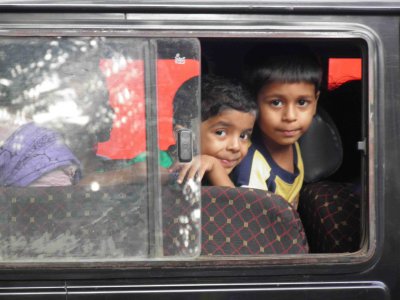 Given the nation's dependence upon –
and fascination with – railways it's hardly surprising some of its
routes rate among those lists and television programmes with titles
like Great Railway Journeys of the World.
Given the nation's dependence upon –
and fascination with – railways it's hardly surprising some of its
routes rate among those lists and television programmes with titles
like Great Railway Journeys of the World.
In one BBC series the routes from Mumbai to Kochi in the southern state of Kerala, Jodhpur to Jaipur, and Kolkata (Calcutta) to Rajasthan were all identified as great trips by train.
The trip Delhi to Rajasthan (on a train known as the Palace on Wheels) was rated alongside the Orient Express and Trans-Siberian by Britain's Telegraph. The Golden Express (Bangalore to Goa) is frequently considered one of India's finest and -- I cannot lie -- I've traveled on the Deccan Odyssey (Mumbai to Goa then inland through Maharashtra state) which is considered it's equal.
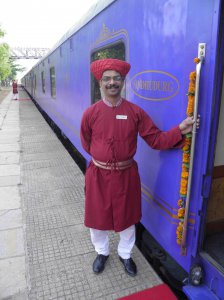 You get – for a significant price –
your own cabin, butler and room service, not that I ever called on
the latter two.
You get – for a significant price –
your own cabin, butler and room service, not that I ever called on
the latter two.
Established a decade ago and frequently undergoing self-analysis to improve on something close to indulgent comfort, the Deccan Odyssey is not for the casual visitor.
Delightful though it is, and that is undeniable, it also delivers emotional distance while another India goes by outside the window.
But however you do it – hard seat and crush-rush to get aboard, or high-end with Harish as your butler – traveling by train in India is how to experience the miracle country. Especially perhaps if you do it the hard way with all that sitting, standing, squatting, pissing, eating and waiting and waiting.
There's poetry in the rattling movement and the exotic destinations . . . and all those faces and places beyond the glass. If there is glass.


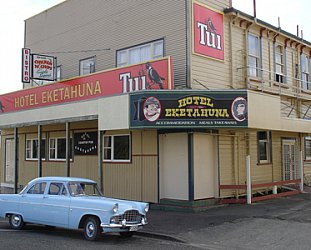
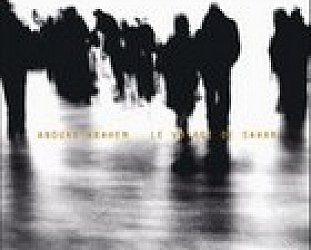

post a comment